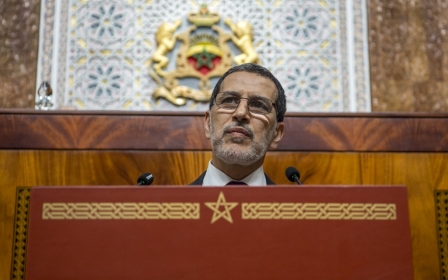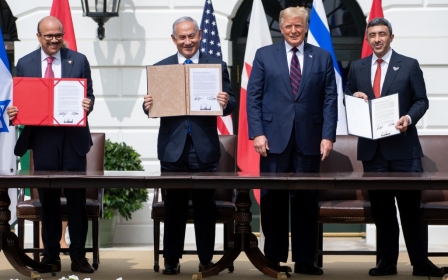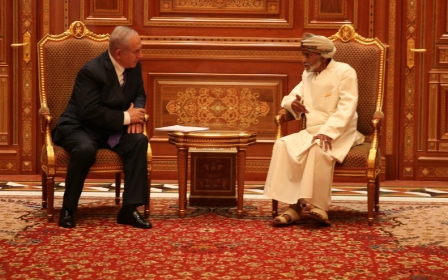Israel normalisation: Is Niger next in line?

The UAE and Bahrain will probably remain the only Gulf states in the Abraham Accords, at least for the foreseeable future - especially after Israel’s recent 11-day Gaza offensive and oppression in Jerusalem, which captured the world’s attention.
Yet, the process of more Muslim-majority countries normalising relations with Israel will likely continue - and the Sahel could be the site of the next diplomatic breakthrough.
Israel has a vested interest in re-establishing diplomatic ties with Niamey to boost its own clout in West Africa
For years, Israeli government officials and media have speculated about Niger normalising relations with Israel. In February 2019, then-Prime Minister Benjamin Netanyahu showed American-Jewish leaders a map of Africa, with all countries labelled as belonging to one of four categories based on their relations with Israel. Niger and Mali were both in the “potential relations” category.
Oddly, that was just a few weeks after Niger’s foreign minister declared there could “be no diplomatic relations with Israel in the context of the occupation of Palestine”.
Last November, three weeks after Sudan joined the Abraham Accords, Israel’s intelligence director cited bilateral discussions with Niger about a possible diplomatic deal, saying such a move would bode well for regional stability.
Stay informed with MEE's newsletters
Sign up to get the latest alerts, insights and analysis, starting with Turkey Unpacked
Now, with Mohamed Bazoum in power - the country’s first Arab president, who has previously supported Niamey normalising ties with Tel Aviv - there are growing expectations it will materialise.
Historical context
There is an important historical context to this discussion. In an interview with Middle East Eye, North Africa researcher Jalel Harchaoui said a move towards normalisation would constitute “simply the resumption of a rather successful diplomatic campaign” that Israel began in the 1950s and ‘60s.
Niger was one of many African countries that cultivated diplomatic relations with Israel in the period between its establishment in 1948 and the mid-1970s. For the Israelis, these diplomatic openings in Africa were important. “This is basic realpolitik 101,” Harchaoui said. “You build a state, you emerge in 1948, and things start looking okay in 1967 because you achieved an impressive victory against the largest Arab nation, Egypt.
“What you start doing is basically looking at your surroundings, and you seek to build a cordiality with whoever you can - especially if it’s not in the Arab world. Because as you acquire those friendships, you basically are enjoying the guarantee that those countries are not going to be your enemies. It’s not a sphere of influence, but it’s a type of acceptability that means a lot in terms of Israel’s survival, security and image.”
But Niger cut off diplomatic relations with Israel in 1973 - the same year that 24 other sub-Saharan African countries also ended formal ties with Tel Aviv. Muammar Gaddafi, who took power in neighbouring Libya four years earlier, had pressured African states to do so.
By 1996, Niger had reinstated diplomatic relations with Tel Aviv. Then, in 2002, when anti-Israel protests were taking place amid the Second Intifada, Niger’s government again severed diplomatic ties. In doing so, Niamey expressed “complete solidarity with the martyred, brother people of Palestine in the heroic struggle for the realisation of their legitimate and inalienable rights”.
Security risks and benefits
If Niger were to again normalise relations with Israel, counterterrorism issues would be relevant to its rationale. Facing threats from the Islamic State and al-Qaeda-linked groups, Niamey may see benefits in relations with Israel from a security standpoint, given that the Israelis could sell Niger drones and other weaponry.
Yet, some analysts have warned that a normalisation agreement could make Niger’s government and society even more of a target for jihadist forces. “Niger is a Muslim country facing jihadist and Islamist [threats to its security],” Mahamadou Abdourahamani, a PhD student in geography at Abdou Moumouni University, told MEE. “A normalisation of its relations with Israel may increase this insecurity.”
As Tel Aviv pursues diplomatic openings with more African countries, the Israeli leadership will work to liken its challenges with Palestinian resistance groups to those facing Niger and other African states amid the presence of local armed groups.
Israeli technology is also part of the appeal. In areas such as agriculture, healthcare and desalination, technology from one of the world’s most innovative countries could help Niger and other sub-Saharan African countries with their development. And when it comes to good relations with Washington and other western capitals, maintaining cordial ties with Israel would bode well.
Yet, while Tel Aviv would be keen to achieve some soft-power gains in Muslim-majority African countries such as Niger, Harchaoui says it is unlikely that Israel would ever be militarily loyal to these states: “In terms of representing a reliable geopolitical friend that will come to your rescue if you run into trouble, Israel is not intending to do that.”
Western perspective
Niger is likely to approach the question of normalisation more cautiously after the Israel-Gaza fighting last May. Niamey was not silent during the outbreak of violence, which killed dozens of Palestinian children. Niger’s UN ambassador, Abdou Abarry, who also chairs the Organisation of Islamic Cooperation, sent an OIC resolution condemning Israel’s “violent and escalating attacks” against Palestinians to the UN.
The Biden administration seeks to build on the Abraham Accords by bringing more Muslim-majority countries into normalisation deals with Israel.
As US Secretary of State Antony Blinken recently put it, the Abraham Accords constitute “an important achievement, one that not only we support, but one we’d like to build on”, adding that the administration was “looking at countries that may want to join in”.
A number of Middle Eastern states, including Saudi Arabia, the UAE, Iran and Turkey, have been jockeying for influence in Niger. In this context, Israel has a vested interest in re-establishing diplomatic ties with Niamey to boost its own clout in West Africa - especially given Israel’s interests in countering Iranian influence across the region. Still, considering the real risks of domestic or regional backlash, Niger is sure to approach the topic cautiously.
The views expressed in this article belong to the author and do not necessarily reflect the editorial policy of Middle East Eye.
Middle East Eye delivers independent and unrivalled coverage and analysis of the Middle East, North Africa and beyond. To learn more about republishing this content and the associated fees, please fill out this form. More about MEE can be found here.







